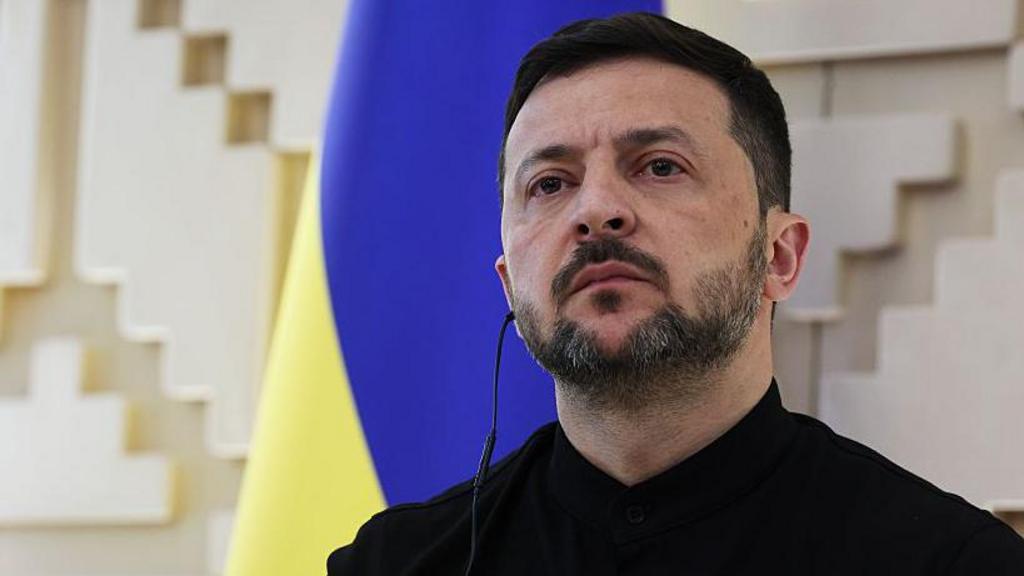Ukrainian President Volodymyr Zelensky has acknowledged “important steps” achieved during discussions with the U.S. in Geneva regarding the cessation of hostilities with Russia. However, he cautioned that the “main problem” persists in the form of Vladimir Putin’s demand for the formal recognition of Russian-occupied territories.
U.S. and Ukrainian officials convened on Sunday to deliberate a 28-point peace proposal, initially formulated by American and Russian officials in October. This proposal had previously sparked concern in Kyiv and among its European allies.
Reports indicate that European nations have devised counter-proposals, having rejected elements of the original plan that appeared to favor Russia’s strategic objectives in the conflict.
It is anticipated that Presidents Zelensky and Trump will meet to address the more contentious aspects of the proposed agreement, although a specific timetable for such a meeting has not been established.
The question of territorial integrity remains a central point of disagreement between Russia and Ukraine. Zelensky has consistently asserted that Moscow should not be rewarded for its aggression through the recognition of territory seized by force, arguing that such a concession would set a dangerous precedent.
Following the conclusion of the Geneva talks, President Trump alluded on social media to potentially “good” developments, while adding the caveat, “Don’t believe it until you see it.”
Russian representatives were not participants in the meeting held in Switzerland, and the Kremlin has stated that it has not received any information regarding the outcome of the discussions. Kremlin spokesman Dmitry Peskov noted that Moscow was aware of “adjustments” made to the plan, which had initially been received favorably by Putin.
The aforementioned 28-point peace plan, drafted jointly by U.S. and Russian officials in October, was presented to Ukraine last week and contained elements that appeared closely aligned with Moscow’s long-standing demands.
Comments attributed to President Trump, suggesting that Ukraine had until Thursday to accept the deal or face substantial reductions in U.S. support, contributed to a sense of urgency across Europe, leading to the expedited convening of talks between Ukrainian and U.S. officials.
By Sunday evening, Secretary of State Marco Rubio stated that “tremendous” progress had been made during the talks. “I honestly believe we’ll get there,” he said.
However, some European leaders have adopted a more cautious stance. “I am not sure if we are closer to peace,” remarked Polish Prime Minister Donald Tusk, while German Chancellor Friedrich Merz characterized discussions as a “lengthy, long-lasting process” and tempered expectations for any immediate breakthroughs this week.
European nations were reportedly caught off guard by the U.S. draft peace plan presented last week, prompting them to seek a more active role in the process.
A counter-proposal, reportedly formulated by Britain, France, and Germany, excluded any recognition of Russian-held regions, proposed an increase in Ukraine’s permissible army size, and maintained the possibility of future NATO membership for Ukraine.
Rubio stated that he was not familiar with the plan, and on Monday, Kremlin foreign policy aide Yuri Ushakov dismissed it as “completely unconstructive.”
Since launching its full-scale invasion of Ukraine in 2022, Russia has consistently demanded the complete withdrawal of Ukrainian forces from the entirety of the eastern Donbas region, encompassing both Donetsk and Luhansk.
The 28-point plan presented last week would require Ukrainian forces to withdraw from the portion of Donetsk currently under their control. This area would then transition into a neutral, demilitarized buffer zone “internationally recognized as territory belonging to the Russian Federation.”
This arrangement would be difficult for Ukraine to accept. Kyiv and its European allies remain wary of any settlement that compromises the principles of territorial integrity and sovereignty, and Zelensky has repeatedly warned that relinquishing the Donbas would leave Ukraine vulnerable to future Russian aggression.
Another key Russian demand is that Ukraine never become a member of NATO. However, Kyiv views membership in the alliance as the most effective means of safeguarding itself from future attacks, and the pursuit of NATO membership is enshrined in the Ukrainian constitution.
Despite the flurry of diplomatic activity last week, the next steps in the process remain uncertain.
The anticipation is that Zelensky will soon confer personally with President Trump, following which a revised draft peace plan will be presented to Moscow. The Kremlin has indicated that there are no plans for a meeting between Russian and U.S. negotiators this week.
British Prime Minister Sir Keir Starmer has stated that further work remains to be done to achieve a “just and lasting peace” in Ukraine. He added that a virtual “coalition of the willing” meeting will take place on Tuesday to discuss developments.
Police are investigating allegations that Jacob Zuma’s daughter, Duduzile, lured men into fighting in Ukraine.
Ukrainian soldiers at the front are angry, defiant and resigned after US plan became public.
A submarine expert says he is “confident” the recovered object is an imploded Russian sonobuoy.
Land drones are increasingly the only means of transporting supplies to the embattled city of Pokrovsk.
Aishat Baimuradova fled her home this year in the hope of living the way she wanted, but she was then found dead in her rented flat.

